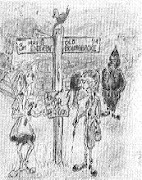Red Dust on Green Leaves
by John Gay (1973)
Liberia
I suppose I first heard of Liberia from ‘The Boy’s Book of Interesting Facts’, or some such title.
I was struck by the fact that the President seemed to have an American name, complete with middle initial, and by its description as a stable African democracy. Even then I knew that to be something unusual in that benighted continent. And when I read that it had begun as a colony for freed American slaves, I even felt proud of the place.
So when it all collapsed into incredibly cruel civil war 30 years ago I felt oddly disappointed. But I soon learned that, while it had been a long time coming, it was all probably inevitable. Because for 150 years Liberia had been divided into two great classes of society – the American descendants, who had always considered themselves superior and civilised, and the indigenous people, who had always been excluded from the democratic process, partly through prejudice, partly through their own reluctance to abandon traditional ways.
Red Dust on the Green Leaves
This book, written just before the troubles and set 30 years earlier, gives, albeit read with hindsight, an inkling of this great divide.
It is the story of twin Kpelle boys, born into a village a long way from the coastal ‘Kwii’, or Westernised Africans and Whites. As they grow up they come to represent the divide in Liberian society, as one learns the lore of the jungle and the other is increasingly attracted by the wonders of the coming world.
The book is not a work of non-fiction, but neither according to the author (an American Episcopalian missionary) is it fiction. The customs of the village, the upbringing of the boys, the attitudes and actions all reflect reality and are brought together to form a narrative.
by John Gay (1973)
Liberia
I suppose I first heard of Liberia from ‘The Boy’s Book of Interesting Facts’, or some such title.
I was struck by the fact that the President seemed to have an American name, complete with middle initial, and by its description as a stable African democracy. Even then I knew that to be something unusual in that benighted continent. And when I read that it had begun as a colony for freed American slaves, I even felt proud of the place.
So when it all collapsed into incredibly cruel civil war 30 years ago I felt oddly disappointed. But I soon learned that, while it had been a long time coming, it was all probably inevitable. Because for 150 years Liberia had been divided into two great classes of society – the American descendants, who had always considered themselves superior and civilised, and the indigenous people, who had always been excluded from the democratic process, partly through prejudice, partly through their own reluctance to abandon traditional ways.
Red Dust on the Green Leaves
This book, written just before the troubles and set 30 years earlier, gives, albeit read with hindsight, an inkling of this great divide.
It is the story of twin Kpelle boys, born into a village a long way from the coastal ‘Kwii’, or Westernised Africans and Whites. As they grow up they come to represent the divide in Liberian society, as one learns the lore of the jungle and the other is increasingly attracted by the wonders of the coming world.
The book is not a work of non-fiction, but neither according to the author (an American Episcopalian missionary) is it fiction. The customs of the village, the upbringing of the boys, the attitudes and actions all reflect reality and are brought together to form a narrative.
See this link:
http://www.thewitness.org/agw/gaysliberia.030402.html
The most remarkable thing about the book is that it is written, as it were, ‘from the inside’. The author succeeds admirably in avoiding any judgment or comment or the intrusion of his own culture or beliefs. No doubt he would be the first to acknowledge the contribution her of his research associate, John Kellemu, who may well have travelled the same journey as one of the twins.
We share the ignorance of the new world, established on the coast, which is gradually, inexorably creeping into the jungle and represented by dark references to ‘Firestone’, for example, or ‘The DC’. Nothing is explained. We have to learn as we go the meaning of ‘Kwii’ or guess what is going on with ‘The Forest Thing’ or ‘The Bush School’.
The civilisation of the village is based on tradition and rooted in the various cycles of life, the crops and the seasons, childhood, adulthood and marriage death. But overall it is static and unchanging. Conversation and decisions are made on the basis of proverbs and wisdom received from the ancestors. There is a social hierarchy, roles for men and women, polygamy allowed but checked by poverty. Questioning is discouraged.
Men’s minds are full of superstition, fears of witchcraft and faith in sacrifices, little different from the new faith from over the water. But there is knowledge of the efficacy of plants and herbs for the forest in healing, and harming.
There are rivalries, jealousies and squabbles, betrayals and immorality. But there are also courts, wise counsel and commitment to the village’s way of life.
But things are changing. Men are tempted – or forced - away by the delights of the coast, such as work, women, cheap consumer goods, and in the case of one of the boys, curiosity and ambition.
The book ends with this boy, well-established in school, having turned his back on village life. His twin remains devoted to the traditional ways, learning his trade of blacksmithing and the secrets of the forest. The ending is melancholic and strangely, in view of the author’s profession, holds out little hope.

No comments:
Post a Comment